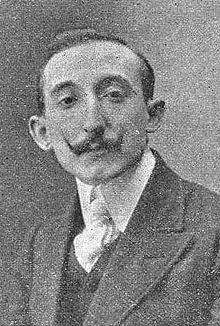Wenceslao Fernández Flórez
Wenceslao Fernández Flórez (born February 11, 1885 in La Coruña , † April 29, 1964 in Madrid ) was a Spanish journalist and novelist .
Fernández Flórez worked early as a journalist for various newspapers in his home province after his father died when he was 15 years old. Among other things, he worked as a political correspondent for El Imparcial and ABC . Many of his articles appeared in book form as Crónicas parlamentarias (1914–1936) .
In 1917 he received the Círculo de Bellas Artes for his debut novel Volvoreta ; 1926 the Spanish National Prize for Literature. His novels were considered exemplary satirical drawings of Spanish conditions, politics and society under King Alfonso XIII. When the Spanish Civil War broke out , he was only able to escape his murder (because of "insufficient support for the Frente Popular" ) by fleeing to the embassies of Argentina and later the Netherlands ; he was finally able to leave the country - events that he later wrote in the novels Un isla en el mar rojo and La novela número 13. In 1945 Fernández Flórez was accepted into the Real Academia Española ; in 1959 he was awarded the Order of Alfonso X el Sabio .
Many of his works were made into films; Altogether there are 27 treatments of his fabrics, often dealing with the beauty and pride of Galicia .
Works (selection)
- La tristeza de la paz (1910)
- La procesión de los días (1915)
- Luz de luna (1915)
- Acotaciones de un oyente (Crónicas parlamentarias, 1916)
- Las gafas del diablo (1918)
- Volvoreta (1917)
- Ha entrado un ladrón (1922)
- El secreto de Barba Azul (1923)
- Visiones de neurastenia (1924)
- Las siete columnas (1926)
- Relato inmoral (1927)
- Fantasmas (1930)
- Los que no fuimos a la guerra (1930)
- El malvado Carabel (1931)
- Aventuras del caballero Rogelio de Amaral (1933)
- Una isla en el Mar Rojo (1938)
- La novela number 13 (1941)
- El bosque animado (1943)
- El toro, el torero y el gato (1946)
- Fuegos artificiales (1954)
Web links and sources
| personal data | |
|---|---|
| SURNAME | Fernández Flórez, Wenceslao |
| BRIEF DESCRIPTION | Spanish journalist and novelist |
| DATE OF BIRTH | February 11, 1885 |
| PLACE OF BIRTH | La Coruña |
| DATE OF DEATH | April 29, 1964 |
| Place of death | Madrid |
